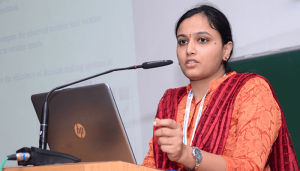According to the study, similarity in weather conditions over specified periods and for lands close in physical proximity enhances reuse of weather-based agricultural advisory.
One of the objectives of the IT for Agriculture Research and Development Centre (ITARD), IIITH is to use information technology to improve performance of services in the areas of agriculture. A few years ago, when researchers from this centre began efforts to improve the efficiency of the agrometeorological advisory service (AAS) with technology-enabled tools, it led to the development of a prototype of an eAgromet system to ease the preparation of agromet bulletins. Essentially to minimize climate and weather-based risk in the agriculture, every 5 days, agromet advisory bulletins based on weather forecasts provided by the Indian Meteorological Department (IMD) are prepared by domain experts at state agricultural universities. These bulletins are then disseminated to farmers and other stakeholders twice a week for each district in the country. It was found that using an IT-based system by the agricultural experts in the preparation of such advisories helps in easing the manual process: where it previously took 2-3 hours, employing an eAgromet system in preparation would only take 30 minutes for the same. It was these observations that led the researchers to experiment with reusing weather data to improve the performance of weather-based decision support systems in various domains.
Reusing Agromet Advisory
Explaining how Integrated agromet advisory services are forecast for a 5-day period for corresponding field units based on the previous 5-days’ data, agricultural researcher Mamatha Alugubelly says that IMD is planning on expanding its scope. “In a bid to improve its coverage, IMD will soon provide block-level AAS based on block-level forecast to 6500 blocks across 600 Indian districts,” she says, adding that preparation and dissemination of the agromet advice on such a large scale within the stipulated time is difficult. In collaboration with the Agro Climate Research Centre, Prof. Jayashankar Telangana State Agricultural University and under the guidance of Prof. P. Krishna Reddy, head of ITARD, Mamatha soon discovered that there was ample scope to improve the efficiency of the bulletin preparation process by reducing human effort involved. The basic premise was that, with the agromet advice prepared for a given block, it is possible to reuse it for other nearby blocks, if the weather condition of that block is similar to the weather condition of nearby blocks.

What They Did
The research team began by collecting 30 years of weather data from Rajendra Nagar weather station of Telangana state. They found similarities in weather conditions over specified periods such as a year, a season, or at different growth stages of crops. To explore similarities in weather conditions at the block level, the team then conducted a series of experiments on 12 blocks for Kharif and Rabi rice crops over a 5-year-period. Their study revealed that if agromet advice based on temporal weather conditions is prepared for a single block for a particular period, then the same advice could be reused for similar weather conditions in subsequent periods. In the same way, weather conditions of one block for a given period were found similar to weather conditions of near-by blocks, implying that reuse of advice based on spatial data was possible here too. “We found that if advisories were created for year 1 and 2, the same could be reused up to 80% in year 3. In fact when both temporal and spatial studies were combined, up to 90% of advisories could be reused by year 3,” explains Mamatha.
What Next
In their future work, the researchers are planning to exploit the reuse of agromet advisory for extreme weather conditions (drought, flood, cold wave, heat wave, hail storm and others) by analysing the historical weather data of a given region based on the concept of dynamic weather conditions. “Many decisions in our day-to-day life are influenced by weather. It is possible to reduce the risk in our day-to-day life through weather-prediction based suggestions. Apart from agriculture, the research provides scope to investigate efficient weather-based decision support systems for improving the efficiency of several other systems such as healthcare, crops, livestock, transport and so on, which deal with life and property,” says Prof. Reddy.



